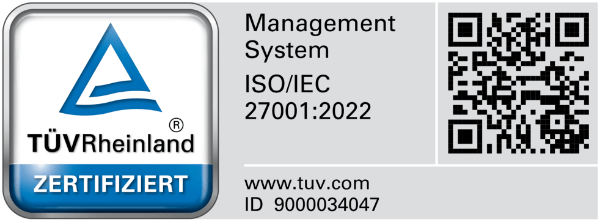In this way, you reliably protect sensitive data from cyber risks and benefit from secure processes in the Salesforce environment.
Cybersecurity and many other advantages
More flexibility, faster processes and all data centrally in one place. The step into the cloud offers many advantages that are beneficial for companies in their daily competition. But where digital transformation and increasingly complex technologies open up new possibilities, security measures must also keep pace. So how can IT security be combined with optimal cloud use?
Cloud computing: data protection and IT security as important as never before
Data protection has become a key quality feature for companies: Those who can reliably protect customer information and company internals are more likely to be perceived as trustworthy and enjoy a good reputation. The reason for the stricter measures is that the number of cyber threats has increased rapidly in recent years. In its report on the state of IT security in Germany, the Federal Office for Information Security (BSI) states that 144 million new variants of malware were created in 2021 alone. These are often malware that - once infiltrated into the company network - allows cyber criminals to gain insight and access to data that is actually confidential.
The attacks are becoming more and more complex: in addition to well-known methods such as sending phishing e-mails, the attackers are developing increasingly sophisticated methods to exploit system vulnerabilities and trick employees. For example, the infiltration of ransomware leads to the fact that access to the company's own data is no longer possible. Only by paying a ransom can the victims regain access.
Security gaps and vulnerabilities: How IT security suffers
Unnoticed gateways and data leaks in the IT infrastructure open the doors for cyber criminals. They can then use the confidential data in various ways to wreak havoc:
Personal information of customers can be profitably resold for the hackers to send spam and phishing messages, for example.
Payment information such as credit card numbers as well as login data of bank accounts can be used for further theft in order to redirect transactions to other accounts without being noticed.
Secret company data can be used for blackmail attempts.
The consequences of digital threats can therefore be far-reaching in an emergency. In addition to financial losses and the usually costly reconstruction of damaged IT systems, companies also have to deal with image losses. The damaged trust in a brand or a company requires time and effort to be restored.
Comprehensive IT security concepts for the cloud take precautions
Before shifting business processes to the cloud, companies should therefore think about a holistic and preventive security concept. This way, vulnerabilities can be identified and eliminated at an early stage, even before data leaks and data theft occur. In addition, legal requirements and obligations such as the IT Security Act 2.0, which came into force in 2021, ensure that companies align their security measures with current standards and increase the level of security.
Another option is to rely on cyber protection measures from experienced cloud service providers. This relieves the burden on the company's own IT department and companies benefit from modern security measures and the latest technologies.
The most common security risks for you at a glance
The many advantages of cloud computing are undeniable: location independence for employees and managers, reduced administrative effort, clear scalability of IT services and less expenditure on hardware. But as the complexity of IT applications increases, so does the risk of security breaches. Therefore, here you will find an overview of common vulnerabilities and learn how to protect your cloud from the threats:
Unauthorised access. It is easy for experienced hackers to crack passwords and user names. With multi-factor authentication, another factor is requested for identification in addition to the user name and password. In this way, data is better protected against unauthorised access.
Data loss. If virtual servers are not configured sufficiently, unintentional access to other virtual instances occurs. This reduces data security and malware can penetrate the system and lead to data loss. | Professional cloud service providers often offer an implemented virus scanner that covers and protects the entire environment and all applications of the cloud.
Interfaces. Interfaces are a central component of clouds, but they also offer a surface for attack, as they make the IT landscape heterogeneous and complex and are easy for attackers to reach. Providers of customised cloud solutions can take measures to integrate and secure interfaces according to the needs of companies.
Data transfer. When using clouds, countless data are moved, whether storing customer data or managing internal information. Data can be lost or intercepted in the process. Encrypted data transmission and storage in the cloud prevents the disclosure or publication of confidential information.
Employees. It is not uncommon for employees to pass on information without permission, whether wilfully or unintentionally. Security requirements must therefore be even higher when it comes to confidential information. With integrated event monitoring, any access to data is viewed and logged. This means that those responsible can be found quickly in the event of data leaks.
Lack of know-how. Cloud computing requires careful handling and operation. Employees do not always have the appropriate technical knowledge to cope with this task. This increases the risk of vulnerabilities. By outsourcing to experienced service providers such as COViS, companies avoid the additional effort and receive comprehensive services in cloud operation. Individual solutions create a high level of IT security and provide comprehensive protection.
Conclusion: All IT security measures at a glance
Coordinated measures are necessary for reliable protection when dealing with sensitive data. Security risks should be kept in view at all times and secure processes created. With our Implementation and requirements management you receive professional help with the implementation of the Salesforce Cloud along the entire transformation and beyond. In addition to consulting, customisation and integration of the cloud, our services also include a Managed Services package that covers the security needs of your cloud all around.



